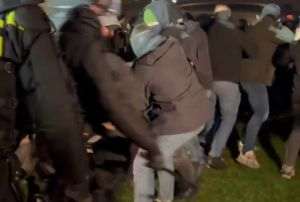The authorities in Israel are ready to retaliate after the air attack launched by Iran at the end of last week, they promise to retaliate at the most appropriate time, but the world's most powerful states from an economic point of view in the G7 and the UN Security Council I ask them not to do it and not to escalate the current conflict in the Middle East. The same position, of not escalating the conflict, is also held by the member states of the European Union, which promise, along with the G7 countries, that Iran will face firm economic sanctions from the Western democracies.
This conflict in the Middle East seems to suggest, in fact, beyond appearances, that it is about the manipulation of the masses, on both sides. No one wants a third world war that could be triggered from there, but both sides are pressured by the masses to attack, and then this collusion occurs, where Iran announces that it will attack and says where and when, and the Americans they demand that Israel not immediately attack Iranian soil - an argument that Netanyahu can make in front of his own citizens and is saved from popular censure. The Jews, as a people, would like a quick reaction on the territory of Iran.
It is possible to talk about an agreement at the top, on both sides, so that, on the one hand, a war does not break out, but on the other hand, it gives satisfaction to its own citizens. The American request enables the Jews to attack by proxy - in Syria, in Lebanon - which they are doing, and to de-tension the popular masses so that they will not pour out their discontent. At first glance, it seems that Netanyahu is cunning and circumventing the American ban by taking revenge elsewhere, in popular terms - it seems to be done by hand - which can even make us suspect that he has passed the phase of fake news in the fake facts phase.
And this is reinforced by yesterday's meeting of the War Cabinet in Israel. According to the Israeli news site N 12, several solutions containing different levels of reaction were put on the cabinet table. Some reactions are minor and some are more intense, and some can be implemented immediately. The cited source says, quoting members of the War Cabinet: "Israel's goal is to hurt Iran, but not to provoke an all-out war. In addition, Israel wants to take measures that are coordinated with the Americans."
Due to the prolongation of the war cabinet meeting, Prime Minister Benjamin Netanyahu's meeting with members of the political opposition, which was supposed to take place yesterday, was postponed, the source said.
The information coming from the Iranian authorities can also be interpreted through the prism of fake facts, which state that they have announced to the USA - through Switzerland - that they will launch an air attack against the Holy Land, but that the targets are strictly military objectives and not civilian ones at all. Britain, through Prime Minister Rishi Sunak, has denied the existence of such messages prior to the attack. Moreover, after the attack, according to Iran's Mehr News agency, citing Al Jazeera, Tehran sent a new message to Washington via Turkey and a message to Israel via Egypt. In the two post-attack messages, the authorities in Tehran warn both the US and Israel of a stronger air response, should the authorities in Tel Aviv decide to attack military targets in Iran.
What is shocking about Tehran's attitude is the way it reported to Jordan, after the air force of that country supported the Israeli defense on the night of Saturday to Sunday, intercepting with the logistical support of French ships in the Mediterranean, several drones and missiles launched by Iran. Thus, according to the state news agency Fars, Iran's Ministry of Defense threatened countries that help Israel with attacks from Tehran. Citing the information provided by Fars, the Israeli news agency Haaretz said that Jordan is being "closely monitored" by the authorities in Tehran and that this country will be the next target of attacks. Iran's Fars news agency quotes a source as saying that Tehran is closely monitoring the actions of Jordan, which could become the "next target" if it helps Israel. In response to these statements, Jordan's foreign minister, Ayman Safadi, announced, according to the Jerusalem Post quoting the Jordanian state broadcaster - Mamlaka -, that he summoned the Iranian ambassador to protest against interference in the kingdom's internal affairs.
In relation to the above situation, we note that yesterday The Wall Street Journal quoted several US officials who stated that Saudi Arabia and the United Arab Emirates had provided information to the US and Israel regarding the attack that Iran was going to launch on Sunday the night.
Another statement coming from Tehran seems to be taken from the Kremlin's texts, which Vladimir Putin and his acolytes have become accustomed to in the last two years. Thus, yesterday, Iranian Foreign Minister Hossein Amir-Abdollahian in a telephone conversation with Ian Borg, the Maltese Minister for Foreign Affairs, Trade and European Affairs, stated that the military action of the Islamic Republic of Iran in response to the crimes of the Zionist regime is within legitimate defense and in accordance with international law.
Russian President Vladimir Putin, who said the Russian Federation launched the invasion in legitimate self-defense and to defend Russian citizens in the separatist republics of Luhansk and Donetsk, also argued the start of the special operation in Ukraine.
The statements of the Iranian foreign minister, however, had a well-defined purpose, namely to strengthen the position of his country, given the fact that Malta holds the rotating presidency of the United Nations Security Council.
• Discussions without result in the Security Council
We do not know what will be the outcome of the approach of the foreign minister of Iran, but if we refer to the emergency meeting of the Security Council that took place on Sunday evening, the debates were heated and did not result in any decision.
Antonio Gutteres, the UN Secretary General told the meeting to member states that the use of force against the territorial integrity or political independence of any state is prohibited by the UN Charter and condemned Iran's attack on Israel.
Antonio Gutteres said: "The Middle East is on the brink. The peoples of the region face a real danger of a devastating full-scale conflict. Now is the time to defuse and de-escalate the situation."
For his part, Robert Wood, the deputy US ambassador to the UN, asked the 15-member body to unequivocally condemn Iran's attack, saying that members of the Security Council have an obligation not to leave Iran's actions unanswered.
The US official said: "In the coming days, and in consultation with other member states, the United States will explore additional measures to hold Iran accountable here at the United Nations. Let me be clear: If Iran or its proxies take action against the United States or further action against Israel, Iran will be held accountable."
In response, Iran's representative to the UN, Ambassador Amir Saeid Iravani, said that his country's action was necessary and proportionate and specified that while Tehran does not seek an escalation or war in the region and has no intention of engaging in a conflict with the US, reaffirms its right to defend itself.
Iravani said: "If the US initiates military operations against Iran, its citizens or its security and interests, Iran will exercise its inherent right to respond proportionately."
Israel's ambassador to the United Nations, Gilad Erdan, accused Iran of violating international law at the meeting and released a video on a tablet that he said showed Israel intercepting Iranian drones over Jerusalem's Al-Aqsa mosque compound, one among the holiest places in Islam.
"Please, you can look," said the representative of Israel to the Iranian ambassador, to whom he really wanted to hand over the tablet. Erdan called on the Security Council to condemn Iran, reimpose sanctions and designate Iran's Revolutionary Guards as a terrorist organization.
In response, Iravani specified that Iran "had no choice but to exercise its right to self-defense", due to the fact that the UN Security Council did not fulfill its duty to maintain international peace and security and did not condemn the Israeli attack on the Iranian consulate in Damascus on April 1.
Iran's position was supported by the representatives of the Russian Federation and China in the Security Council, who also referred to the "unacceptable humanitarian catastrophe in Gaza" and called for a ceasefire.
• G7 and EU are preparing new sanctions against Iran
Leaders of the G7 countries - the group that brings together the world's most powerful democratic economies - condemned Iran's attack on Israel and vowed to work to try to prevent an "uncontrollable regional escalation" in the Middle East, following a meeting that place on Sunday.
Britain, France and Germany yesterday urged Israel not to retaliate against Iran, warning that a military response could plunge the Middle East into all-out war. David Cameron, Britain's foreign secretary, told the BBC that the authorities in Tel Aviv needed to "think rationally", especially since the attack was a "double defeat" for Iran because it failed to cause major damage to Israel. in what Regarding Iran, David Cameron said the UK government was considering taking new diplomatic measures on top of the 400 sanctions it has already implemented.
French President Emmanuel Macron said, quoted by BFM TV, that he suggested to Israel to start a policy of isolating Iran rather than one of retaliation. The situation in the Middle East is "very unstable," the French leader added, adding that he had told Israel's leaders to show restraint to avoid a conflagration.
German Chancellor Olaf Scholz declared yesterday, on the occasion of his official visit to China, that he will campaign for the de-escalation of the conflict and warned the authorities in Tehran that Iran can no longer continue with such unjustified attacks on the states of the Middle East. German Foreign Minister Annalena Baerbock said in Paris yesterday that after "defensively winning", Israel must now secure victory through diplomatic means to prevent an escalation of the conflict.
The foreign ministers of the European Union were summoned by Josep Borrell, the EU High Representative for External Relations and Security Policy, for a meeting that would take place today in Brussels and during which the situation in the Middle East will be debated following the air attack to which Iran subjected Israel. Diplomatic sources have stated for the BBC, but also for the French media, that the proposal of sanctions by the European Union regarding Iran is not excluded.
French Interior Minister Gerald Darmanin asked prefects to tighten security measures at Jewish places of worship as well as religious schools from April 22-20 as the Pesach (Jewish Passover) holiday approaches. The French official asked government representatives in the territory to pay "attention" especially to "services and gatherings that traditionally attract a large audience", the decision being taken in light of the "very high level of terrorist threat", due to "maintaining a high level of acts of an anti-Semitic nature" and "the persistence of tensions at the international level, including Iran's attack on Israel", according to a press release issued by the French Ministry of the Interior.
Regarding the de-escalation of the situation, Nasser Kanaani, the spokesman of the Iranian Ministry of Foreign Affairs, assured, according to the Iranian news agency Tasnim, that Tehran does not seek an escalation of tensions in the region after its retaliatory operation against military targets of the Israeli regime from the occupied territories.
He described the operation that Iranian military forces carried out early Sunday in retaliation for an Israeli airstrike on the consular section of the Iranian embassy in Damascus as a "necessary and proportionate" punitive mission that struck only military targets.
Moreover, the Iranian official warned that Israel will suffer more serious consequences if it crosses certain red lines, lines that Nasser Kanaani did not name for the Iranian news agencies.
Despite assurances from Tehran officials that the attack on Israel is over, on Sunday and yesterday the Israeli air force and US forces in the region intercepted several drones sent from Yemen to the Holy Land by the Houthi rebels, showing that either the Iranian authorities lie, or some terrorist groups in the Middle East have gotten out of control.
In these conditions, no one was surprised by the decision of the low-cost airline EasyJet to cancel all flights to and from Israel, until April 21, according to a statement published by the Jerusalem Post and Times Of Israel, even though all airports in Israel and from the other countries in the Middle East have been reopened since Sunday for civil air travel.
• Ukraine sees the air support provided by its allies to Israel as a beneficial precedent
The involvement of the US, Great Britain and France in Israel's air defense is seen as a beneficial precedent by the authorities in Kiev who requested similar support for Ukraine's air defense through the voice of President Volodymyr Zelenskiy on Sunday evening.
According to Reuters, Volodymyr Zelensky said: "The whole world saw that Israel was not alone in its defense; aerial threats were destroyed by his allies. When Ukraine says that allies cannot turn a blind eye to Russian missiles and drones, it means that they need to act together and act strongly."
The Ukrainian president's position has also been taken up by some political leaders in the Czech Republic who have called for European states to defend Ukraine's airspace as the US, Britain and France have done for Israel.
According to Euractiv.com, Martin Dvorak, the Czech Minister of European Affairs stated in a post on the network social media outlet X (formerly Twitter): "The Ayatollah's night attack on Israel was successfully repulsed thanks to a swift international response and a desire to defend the airspace. It's a shame that we don't defend the airspace over Ukraine with the same vigor." For her part, her party colleague who is the head of the list for the European Parliament elections, Danuse Nerudova, wrote on X: "Ukraine deserves the same strong defense that Israel has rightly received from its allies."




























































